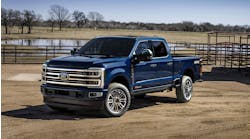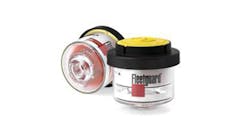As of Oct. 2, Diesel Technology Forum, an organization pushing for advancements in internal combustion engine (ICE) technology, as well as fuel, will operate as the Engine Technology Forum.
The DTF, in operation since 2000, has helped members navigate increasingly strict emissions regulations and drastic changes to diesel technology, including the introduction of diesel particulate filters (DPFs), selective catalytic reduction (SCR), and diesel exhaust fluid, to name a few.
A statement from the newly formed ETF asserted the forum is a place for "fact-based discussions as well as debate about all options for meeting our energy, environmental, and economic goals," with a goal of working with all stakeholders including government, industry, environmental, and community groups seeking solutions to reduce greenhouse gas and other emissions.
“Internal combustion engines like diesel, gasoline, and natural gas are the fundamental power behind our economy and mobility. Continued innovations in efficiency, lower emissions, new engine designs, and new fuels offer tremendous promise for the future of ICE technology and helping meet our societal goals,” says ETF Executive Director Allen Schaeffer.
The organization recognizes that while there's a push for the transition to electric vehicles, they see new opportunities for diesel and other internal combustion engines and fuels that also contribute to reduced greenhouse gases and carbon emissions.
“There are many pathways to a reduced carbon future, and we should embrace all of them,” Schaeffer said. "Some technologies like internal combustion engines and cleaner fuels are more certain and available today, while others may hold greater promise for the future. Members of the new ETF are leaders in both advanced internal combustion engines and zero-emissions technologies that provide the best solutions for their customers."
Some of those new technologies will be needed soon, as the Environmental Protection Agency’s next round of major emissions regulations take effect in 2027. For the first time since 2010, the EPA is tightening NOx standards for heavy-duty commercial vehicles, and will allow 0.035 grams per horsepower-hour during normal operation, 0.050 grams at low load, and 10 grams at idle.
Read more: The Amazing Emissions Race
“There’s no question the rules will be a challenge for manufacturers to meet, but in ways different than previous emissions milestones,” Schaeffer previously told Fleet Maintenance. “Technically the required NOx emissions reductions are significant, to the tune of 82% lower than today’s levels—which are already near zero (0.20 g/BHP-hr.)."
A major challenge ahead will be convincing the public that diesel technology is still viable in an era of zero emissions. This sentiment is echoed even by OEMs launching an array of EVs, such as General Motors.
"The ICE age is not over," GM President Mark Reuss relayed to Fox Business last year. "We’re not going to abandon our internal combustion engine segments."




